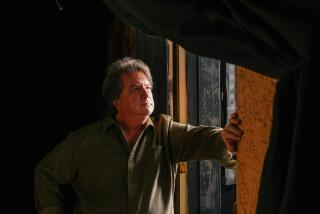Review: ‘Indecent’ is a moving reminder of art’s power to expose truths
When the Polish Jewish writer Sholem Asch wrote “The God of Vengeance” in 1906, Broadway wasn’t, it’s safe to say, at the forefront of his mind.
The play, written in Yiddish, revolves around a crisis in a family that’s no ordinary family: A brothel owner wants his daughter to marry a respectable Jewish scholar, but she falls in love instead with the most prized prostitute in his stable.
Oy vey! Lesbians, hookers and a Jewish writer showing Jews in a bad light!
SIGN UP for the free Essential Arts & Culture newsletter >>
The play became an international hit, but what a lot of tsoris for Asch after he had become a naturalized American citizen and a producer had the bright idea of bringing an English version of the play to Broadway.
Not only did the playwright have to submit to warping script changes before the show opened at the Apollo Theatre in 1923, but the actors and the producer were arrested on obscenity charges following a performance. A trial ensued leading to their conviction. This was eventually overturned but not before the play was forced to close.
Paula Vogel, the Pulitzer Prize-winning author of “How I Learned to Drive,” tells the story of the tumultuous life of “The God of Vengeance” in her new play, “Indecent,” which is at the La Jolla Playhouse through Dec. 10.
This isn’t a character study of Asch but a Brechtian-style meditation on his controversial work. Organized chronologically with thematic bullet points, the writing at times has the tone of a jazzy lesson plan. But Rebecca Taichman’s darkly entrancing production, which began at Yale Repertory Theatre, lends the material theatrical urgency and sizzle.
“Indecent” begins with seated ensemble members being called upon to reenact the saga of Asch’s play. (Taichman’s company includes seven actors and three onstage musicians.) Lemml (Richard Topol) introduces himself as the stage manager. As dust pours from his hand, he holds up what he says is the original manuscript of “The God of Vengeance.”
Lemml proceeds to take us back in time to 1906 Warsaw. A young Asch, having just completed his first play, anxiously awaits his wife’s reaction. She loves it and is determined, with help from her father’s money, to get it into the right hands.
With supertitles projected in English and Yiddish, the production fills us in on the various stops in the play’s journey — Berlin, St. Petersburg and New York, where “The God of Vengeance” became a staple of the thriving Yiddish theater scene. An English-language production at New York’s Provincetown Playhouse, where Eugene O’Neill was making his name, leads (after an extended run in free-thinking Greenwich Village) to the Broadway transfer — and a firestorm of hypocritical hubbub.
Vogel resurrects this theater history with a modern difference: The purest element in the saga over Asch’s play is the love of the two female characters. Their romantic attachment stands in stark opposition to the pogroms, war and genocide — the real disgrace of the world — that the playwright and his people were contending with.
A later scene in “Indecent” takes place in 1943 in the Lodz Ghetto, where a production of “The God of Vengeance” is being staged in an attic by actors who are willing to accept being paid in food by their audience. “Last week we presented Act I, and God willing, next week we will still be here to perform Act III,” says Lemml, who left the U.S. in disappointment with Asch for not strenuously defending his own play when it was on trial.
Lemml’s rapturous and completely unsalacious devotion to the lesbian love story at the heart of Asch’s play has a fanatical quality that can seem strained. His emotion, bordering at times on religious fervor, is clearly a surrogate for the playwright’s and director’s. Vogel, who created the work with Taichman, wants to capture the ardor of theater people who champion art more farsighted than their own age.
The play doesn’t delve deeply into the progressive layers of Asch’s drama identified by theater critic Alisa Solomon in her book “Re-Dressing the Canon: Essays on Theater and Gender.” According to Solomon, “the more radical impact of ‘God of Vengeance’ came from the complex, challenging ways in which the play satirized piety, exposed domestic violence, revealed the constraining options available to women within a traditional Jewish world, and most insolently of all, philosophically rhymed whoring with Torah.”
“Indecent” offers a more narrowly queer (in the gay studies sense) reading of this history. The circumscribed scope isn’t always dramatically convincing, but the play’s alternative moral vision is moving in its passionate conviction.
Riccardo Hernandez’s spare scenic design situates us in a theater but with a sense of history as the backdrop. This effect is achieved in collaboration with the sorcery of Christopher Akerlind’s lighting and the artful projections of Tal Yarden and Keith Skretch.
Composers Lisa Gutkin (who plays the violin) and Aaron Halva (who plays the accordion), along with Travis W. Hendrix on clarinet, add sumptuous Klezmer textures to the staging. The musical fluidity, enhanced by David Dorfman’s choreography, makes this feel more like a devised work than a traditional play.
Flowing in and out of their roles with impunity, the actors (Katrina Lenk, Mimi Lieber, Max Gordon Moore, Tom Nelis, Steven Rattazzi, Adina Verson) suggest rather than embody their characters. Topol’s Lemml has one foot firmly planted in history, the other poised spryly on a stage. The communal act of make-believe is openly celebrated in a work that cherishes the backstage view.
One shortcoming may be unavoidable. In the reenactments of climactic scenes from “The God of Vengeance,” the brilliance of Asch’s work is assumed rather than manifested. We only get fragments, delivered in a melodramatic style that can turn self-consciously poetic.
But “Indecent” reminds us of the power of art to tell us truths long before we are able to recognize them as such. What was once so daring seems today infinitely touching in its innocence.
------------------
‘Indecent’
Where: Mandell Weiss Theatre, La Jolla Playhouse, 2910 La Jolla Village Drive, La Jolla
When: 7:30 p.m. Tuesdays-Wednesdays, 8 p.m. Thursdays-Fridays, 2 and 8 p.m. Saturdays, 2 and 7 p.m. Sundays. Ends. Dec. 10.
Tickets: Start at $25
Info: (858) 550-1010, www.LaJollaPlayhouse.org¿
Running time: 1 hour, 50 minutes
ALSO:
‘Macbeth’ succeeds in avoiding its onstage curse when it’s on-screen
‘Straight White Men’ gently wrestles with the meaning of privilege
More to Read
The biggest entertainment stories
Get our big stories about Hollywood, film, television, music, arts, culture and more right in your inbox as soon as they publish.
You may occasionally receive promotional content from the Los Angeles Times.







